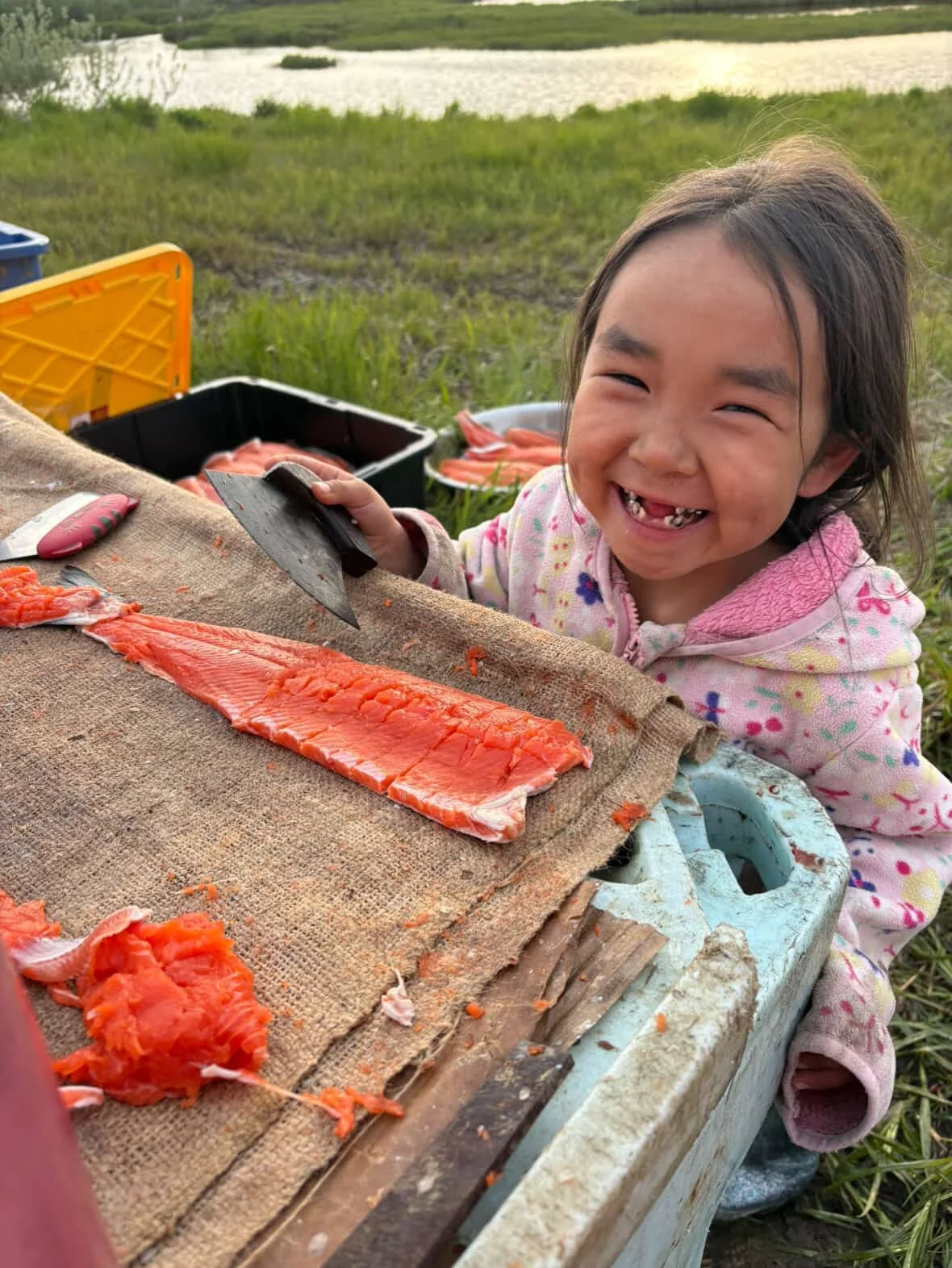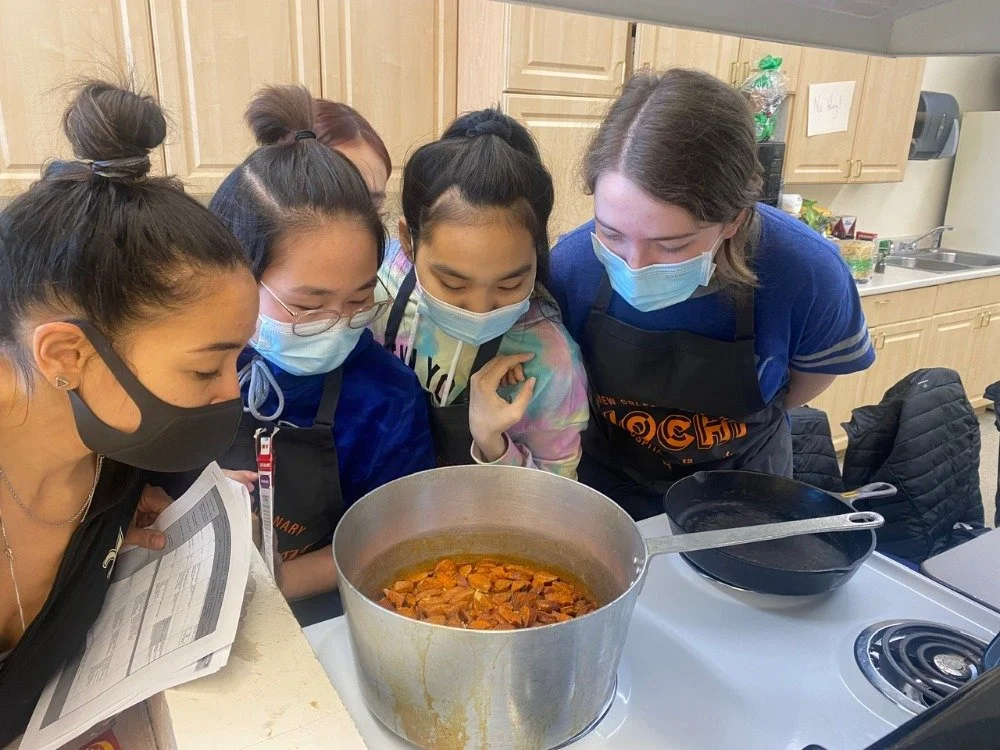Mission
The Dipping Spoon mission identifies and empowers the Next Generation of Indigenous Youth to become Culinary Rockstars and Food Systems Leaders by creating access to inclusive and dynamic FoodSTEM programs, Edible Garden, and Workforce Development initiatives rooted in Cultural Identity and Food Sovereignty.
Chefs are rockstars, food is their paint! We meticulously craft an ecosystem of opportunity, redefining the intersection of food and innovation. Our comprehensive approach spans Science, Technology, Engineering, Arts, and Mathematics, culminating in an understanding of Public Policy—each facet deliberately sprinkled with Equity. We reveal the rich tapestry of educational, entrepreneurial, and empowering careers found within the heart of food.
FoodSTEM Programs
Food is a mechanism to learn, teach, understand, share and not just eat.
Food Sovereignty and Culinary Education are 100% STEM & ELA.
SUPPORT AN AFTER-SCHOOL CULINARY CLUB & EDIBLE GARDEN
SelfSTEAM is an after-school culinary club and edible garden for K-12th-grade Indigenous Alaska Native girls and boys, which celebrates culture, nature, identity, and the earth through Food and STEAM: Food, Science, Technology, Engineering, Arts, and Math.
CULINARY ARTS CAMP INTENSIVE
SelfSTEAM Kenirvik: Salt, Fat, Acid, Heat, is a week-long Culinary Arts Camp Intensive teaching the fundamentals of cooking, cultural identity, food sovereignty and traditional values merged with modern day techniques and the four basic elements that preserve and make food taste great.
Why It Matters
Access
•
Representation
•
Cultural Identity
•
Access • Representation • Cultural Identity •
IMPACT
Fall/Spring 2021-2022
Dipping Spoon partnered with the Lower Kuskokwim School District (LKSD) for our inaugural FoodSTEM curriculum and after school club, SelfFSTEAM.
The culinary club piloted at 3 small rural school village sites Tuntutuliak, Goodnews Bay and Kipnuk with 100 students over the course of the school year. Dipping Spoon students utilized Chef Alice Waters and UC Berkeley’s inclusive and dynamic Edible School Yard curriculum. The Edible Schoolyard’s curriculum introduced basic knife, cooking and cleaning skills; with the curriculum slightly altered based on the needs of Bethel’s rural location. This included creating our own harvest map and seasonal hunting guide. Each school site utilized hydroponics to grow their own fruits and vegetables and were equipped with seedlings educating students on seed history, proper grow methods and recipe development. Science, engineering and technology in action.
IMPACT
April 2022
Dipping Spoon held its first week long FoodSTEM Culinary Arts Camp Intensive at Bethel Regional High School for Indigenous students from the Lower Kuskokwim Delta. Our students traveled by air from six village sites. Camp participants were 90% Female, 10% Male; 90% Yup’ik and 10% White. In total we had 5 Freshmen, 1 Sophomore and 3 twelfth graders.
The culinary camp, SelfFSTEAM Kenirvik: Salt, Fat, Acid, Heat taught the fundamentals of cooking as students dove into the four elements that make food taste great. Camp leaders loosely followed Chef Samin Nosrat’s cookbook and Netflix show and format: Salt, Fat, Acid, Heat. Each day was themed with discussions around taste, flavors, cultural similarities while we cooked and merged traditional values with modern day techniques.
IMPACT
SelfFSTEAM campers took field trips to the grocery store and visited the only farm in Bethel, Alaska, on virgin Tundra, Meyer Farm. Students journaled about their cooking experiences at home and camp, blind tasted food, noted what excited or didn’t about a new taste and flavor, produced their own food photography, food writing, menu development and working together as a team. They learned when we respect our ingredients in the kitchen and workstation, we in turn are respecting the land, ocean and sky. Which leads to our identity and culture, and honoring our traditional foods.
After a week long intensive, cooking 2 meals a day our campers took on the ambitious task of catering Bethel Regional High School’s Student Art Showcase where they debuted their culinary art and menu for over 200 community members. Dividing into groups, they assembled the line; found their ingredients, measured the right amounts, mix the batter, turn on the stove, etc.
Chef are artists, food is their paint. Chef’s are also scientists, chemists’, mathematicians, poets and businesspeople. Our students embarked on a massive feat and delivered big time on taste, presentation, flavor and creativity.
WHY IT MATTERS
The future of food is Indigenous.
Indigenous Alaska Native Peoples and culture can be traced back 10,000 years. We are the original stewards of this land and have incorporated subsistence food techniques such as Drying, Smoking and Fermenting in our traditional cuisines for generations. We’re innovators, inventors, scientists, engineers, mathematicians, creative designers, hunters and gatherers adapting to harsh weather conditions since time immemorial.
Alaska’s uncertain food future, due to climate change is threatening food sources and cultural traditions. This was made quite evident when a Yup’ik student attempted to break down a pork shoulder for Carnitas tacos and started to carve the with a Western style knife, in lieu of the traditional Uluaq knife she uses at home. She struggled. A camp leader asked her if she’d rather use an Uluaq. Her answer, an enthusiastic, Yes! Once she started again on the meat, this young woman transformed. In amazement, we all watched her effortlessly and gracefully carve down a massive pork shoulder led with ancestral expertise. She was filleting with an heirloom, a Yup’ik timepiece. Why couldn’t our Yup’ik camper break down traditional Moose or Caribou meat? Outdated Policy Laws.
When we compare Alaska Native cuisine to other cultural cuisines, Yup’ik and Inupiaq foods are just as worthy. Alaska Salmon, Alaska Snow Crab, Alaskan seafood anything is recognized as premium all over the globe, why can’t our Indigenous foods be honored as such? Why can’t our Native foods be reflected or purchased at grocery stores or served in restaurants and schools?
We believe in the Global Impact of Indigenous foods, cuisine and the transmission of traditional knowledge. The ancestors of our students come from a lineage of cultural experts who have preserved our identity and successfully understood the driving forces behind Indigenous Subsistence Foods. These are natural preservatives. Salt preserves food. Fat preserves food. Acid preserves food. Heat in conjunction with all the other preserves food. Everyone relies on Native Food in rural Alaska. The future of Agriculture is Indigenous. Farm to table is nothing new. It’s a gentrified term for substance living. Yet our transmission of traditional ancestral knowledge food and all the industries food touches is missing, undervalued and unrepresented in a modern world, more pointedly, through education and business.
Due to continuing lack of access and specialized educational, creative entrepreneurial career development for youth, the Colonization of Indigenous Culinization, challenges cultural and economic survival.
The 2010 U.S. Bureau Census states that 5.2M American Indian and Alaska Natives are currently living in the United States.
1.7% of total U.S. Population
18% increase since last decennial census
More than 2.1M American Indian and Alaska Natives are under the age of 24 years old
42% of total American Indian and Alaska Native Population
Additionally, According to the census, Alaska Native people compromised roughly 18% of the states population, with an active increasing growth in young Native people under 24 years old in rural villages.
Due to this rising rate, we ask, where are the educational and business developmental opportunities for Young Native Youth? Where will our communities food resources come from? How will a predominately young Yup’ik demographic adapt to massive income inequality and underemployment? Will our traditional foods and tools be forgotten?
Our North Star is fueled by access, representation and cultural identity. We envision a global world where all Indigenous youth champion their culture, ancestral blueprint to rebel against institutional boundaries to become entrepreneurial culinary rockstars through Food, Science, Media, Sports, Design and Foreign Policy in the Public and Private Sector.
It is clear in lieu of Dipping Spoon’s FoodSTEM programs, an Accredited Indigenized Culinary Arts Curriculum must be developed to ensure cultural identity and food traditions for the Bering Sea School District and Lower Kuskokwim School Districts.
Dipping Spoon’s work focuses predominately with Alaska Native Youth of Yup’ik, Siberian Yup’ik and Inupiaq Descent from the lower Yukon Kuskokwim Delta and soon to Bering Strait School Districts in K-12th both located in rural Alaska on the coast of the Bering Sea. Due to Rural Alaska’s unique geography all school sites in the Lower Kuskokwim School District and Bering Sea School Districts are only accessible year round by by boat or small bush aircraft. LKSD is Alaska’s largest rural school district in the number of schools, students, and staff.
It is located approximately 400 air miles west of Anchorage, Alaska, the district encompasses the lower part of the Kuskokwim River Delta, along the coast of the Bering Sea.
It is Alaska’s second largest rural school district in terms of geographical area with roughly 22,000 square miles of roadless tundra, and area equivalent in size to the state of West Virginia. Headquartered on the main campus in Bethel, Alaska; the district office provides coordination of services and support to 22 village and 6 Bethel schools.
In 2024 Dipping Spoon’s work will be servicing 5800 students over a combined area of 102.00 square miles. Rural Alaska’s unique geography, cultural diversity and traditional foods pathways are what makes the region standout out nationwide.
Contact us.
info@dippingspoon.com
Mailing Address:
5300 E. 4th Ave, #303
Anchorage, AK 99508
CULTIVATING CULINARY ROCKSTARS, ROOTED IN CULTURE







